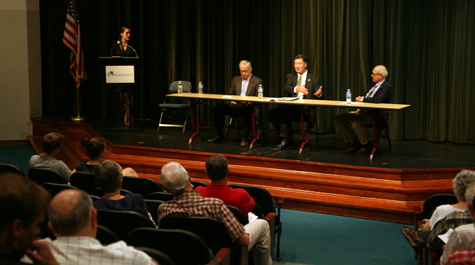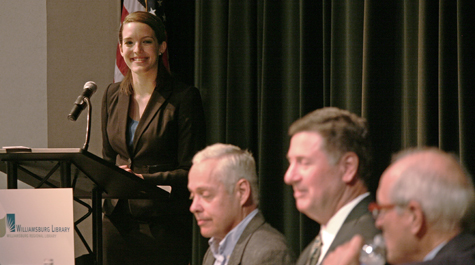Community Celebrates Constitution Day with Constitutional Conversations Event
On Thursday, Sept. 12, William & Mary law students gathered with members of the local community in the Williamsburg Regional Library’s theater for the first event of the fourth annual series of Constitutional Conversations.
Entitled “The Importance of Civic Participation,” the conversation was moderated by William & Mary law student Laura E. Vlieg ’14 and featured panelists George Allen, former Governor of Virginia, U.S. Representative, and U.S. Senator; Clyde Haulman, Mayor of Williamsburg and Professor Emeritus of Economics at William & Mary; and C. Lawrence Evans, Newton Family Professor of Government at William & Mary.
Each panelist reflected on the importance of civic engagement and provided suggestions for fostering participation amid its alleged decline. Allen tackled the issue of voter non-participation, pointing out the importance of an individual vote, using the example of his first election, which he won by only 25 votes. Discussing challenges in today’s political climate, Allen said that “too often in campaigns, people are motivated by fear or dislike of the other person,” as opposed to issues genuinely affecting their interests.
Allen closed with three proposals to return the focus to citizens’ interests: employ fair voter redistricting to reflect communities of similar interests, include a “none of the above” option on ballots for major offices, and allow states to propose amendments to the U.S. Constitution.
As the local mayor, Haulman noted that, in Williamsburg at least, “political participation and civic engagement is alive and well.” He pointed to vast interest in community leadership positions and to tremendous involvement by William & Mary students, who collectively volunteer for more than 300,000 hours each year to help local government and nonprofit organizations provide crucial services.
Haulman also noted the growing importance of the courts as a means by which citizens effect societal change in modern politics. “Informed citizens are important,” he said, “but their power to make change comes from suing as much as voting; and activist lawyers who understand how to challenge constitutionality through the court system are far more powerful than the average citizen.”
Evans noted that although there exists a general perception of declining civic engagement, participation is actually quite high. The nature of participation has simply changed, with social media or campaign contributions replacing direct involvement.
Discussing the problem of polarization, Evans noted that although the majority of citizens lie in the center of the political spectrum, “centrist public opinion has not been engaged directly” due to louder and more active groups at the fringes that attract candidates’ attention. Evans suggested that civic engagement in this environment requires “becoming informed about issues and becoming serious, and having a nuanced view about issues.”
The evening culminated with a substantial period of dialogue, where the panelists fielded questions from the community on various topics.
Constitutional Conversations is an award-winning community education initiative designed to bring law students into the community to promote civic awareness. The event was co-sponsored by the Law School’s Institute of Bill of Rights Law, the Williamsburg Regional Library, and the Colonial Williamsburg Foundation.
About William & Mary Law School
Thomas Jefferson founded William & Mary Law School in 1779 to train leaders for the new nation. Now in its third century, America's oldest law school continues its historic mission of educating citizen lawyers who are prepared both to lead and to serve.




